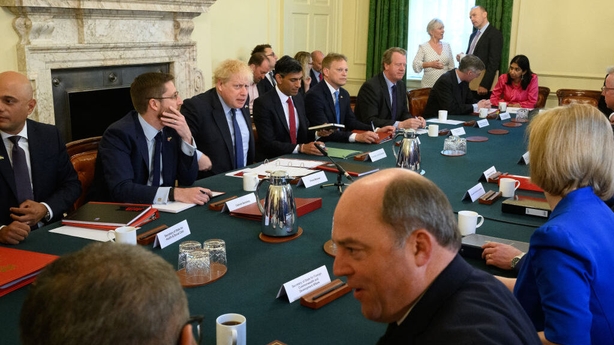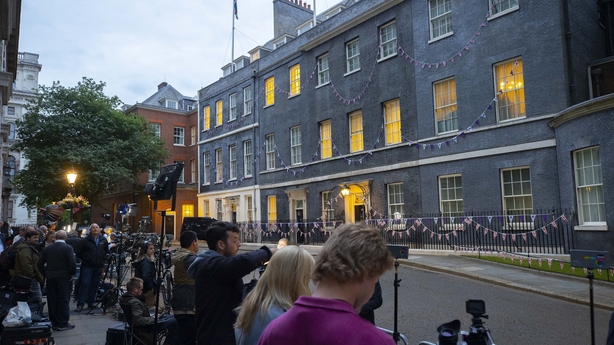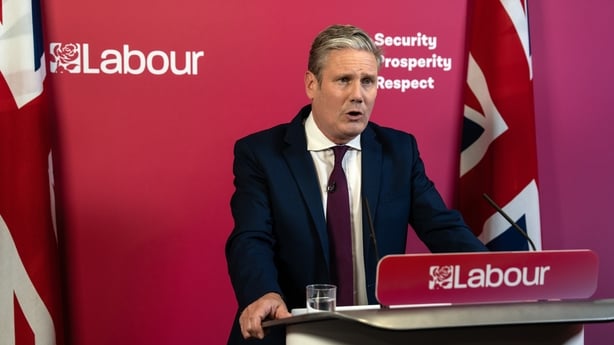UK Foreign Secretary Liz Truss has joined a chorus of British cabinet members saying it is "time to move on" from Conservative leadership row and focus on the ongoing challenges, such as the dispute with the EU over the Northern Ireland Protocol.
Speaking to the BBC from the House of Commons lobby, Ms Truss refused to be drawn on whether she harboured any leadership ambitions of her own, saying she spent her entire time working with government colleagues.
Meanwhile, British Prime Minister Boris Johnson has promised to cut taxes and drive down the cost of government after the wounding revolt by Tory MPs put his long-term future in doubt.
Mr Johnson thanked Cabinet colleagues for their efforts to support him during the confidence vote process, which saw more than four in ten Tory MPs say they had lost faith in his leadership.
In an attempt to address criticism of his economic policies, Mr Johnson said the "fundamental Conservative instinct" was to allow people to decide how to spend their money, urging Cabinet ministers to cut costs.
He said "delivering tax cuts" would help deliver "considerable growth in employment and economic progress".
Despite Mr Johnson's attempts to draw a line under questions about his leadership, critics warned that the political crisis was not over after 41% of his MPs said they no longer had confidence in him.
Tory MPs voted by 211 to 148 in support of the prime minister, but the scale of the opposition was greater than that seen in 2018 when Theresa May faced a confidence vote.
She was ultimately forced out within six months.
Opening a Cabinet meeting in Downing Street, Mr Johnson said: "We are able now to draw a line under the issues that our opponents want to talk about."
That included focusing on his "levelling up" agenda to address regional inequality, measures to help deal with the rising cost of living and improvements to public services.
But he asked ministers to "make sure that you're thinking the whole time about cutting the costs of government, about cutting the costs that business has to face and of course cutting the costs that everybody else faces, families up and down the country".

Read more:
Who could replace Boris Johnson?
Boris Johnson wins Conservative Party confidence vote
Room for manoeuvre reduced by confidence vote result

Reforms to regulations could help cut costs in areas such as energy, transport or housing, Mr Johnson said, telling ministers "there is ample scope for us to get out of people's way and to do things better".
He told ministers: "Over the course of the next few weeks, I'm going to ask everybody to come forward with ways in which we cut costs, drive reform, and make sure that we understand that in the end it is people who have the best feel for how to spend their own money rather than the government or the state. And that is our fundamental, Conservative instinct."
Allies have rallied round Mr Johnson, but former Tory leader William Hague said "the damage done to his premiership is severe" and he should quit rather than prolong the agony.
Mr Johnson's authority faces further blows with tricky by-elections on 23 June in Wakefield, West Yorkshire, and Tiverton and Honiton in Devon.
But Deputy Prime Minister Dominic Raab sought to play down the impact of potential losses in the two Tory-held seats, claiming "governments of the day often lose by-elections to go on to win them at a general election".
British Prime Minister Boris Johnson has said he is 'grateful to colleagues' for their support after he survived a bruising no confidence vote | Read more: https://t.co/Ad6wYo4lJ3 pic.twitter.com/Fm7LEXW5Pn
— RTÉ News (@rtenews) June 7, 2022
Mr Hague, writing in The Times, said he would have regarded a situation where more than a third of MPs voted against his leadership as "untenable".
"If, with all the power of the party leadership, all the years of acquaintance with MPs, all the knowledge they have of your abilities and plans, you still cannot crush a vote of no confidence by a commanding margin, then not only is the writing on the wall but it is chiselled in stone and will not wash away," he said.
Tory MP Andrew Bridgen, a prominent critic of the prime minister, said: "Lord Hague is right. The residual concerns from across the party will continue to remain."
He said Mr Johnson "should now leave with honour and residual affection for what he has achieved".
Tobias Ellwood, chairman of the Commons Defence Committee and another Tory MP who has called for Mr Johnson to quit, suggested the prime minister would only survive for "a matter of months".
Former minister Philip Dunne, MP for Ludlow, told BBC Radio Shropshire he had voted for "a new vision for the party and a new degree of competence at the heart of government".
"It's not going to happen for now, but we'll have to see what happens in the coming weeks and months. This is not over."
Labour will seek to heap further pressure on Mr Johnson by asking MPs to vote to adopt a package of recommendations put forward by the Committee on Standards in Public Life in a report last year.

These include a call for Mr Johnson's ethics adviser to "be able to initiate investigations into breaches of the ministerial code".
The prime minister previously said he was putting in place an "enhanced process" for his independent adviser on the code, Christopher Geidt, to initiate his own investigations into possible breaches, but that he would still need Mr Johnson's consent before proceeding.
The chairman of the standards watchdog, Jonathan Evans of Weardale, said the change, while an improvement on the previous position, meant the adviser was still not "sufficiently independent".
The Liberal Democrats are pushing for a Commons confidence vote in the prime minister as a whole after Mr Johnson survived the Tory process, although there is no date fixed for the move and it is unlikely to be successful.
Lib Dem leader Ed Davey said: "Every Conservative MP who has a shred of decency must back our motion and finally give Johnson the sack."
